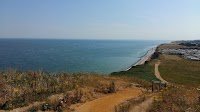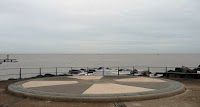The Peddars Way - Knetishall Heath to Watton

An easy trek across Breckland on the initial stages of the Peddars Way.
Being an old Roman road, the original Peddars Way is dead straight and there is little modern deviation from the original path all the way through to the North Norfolk Coast. This first stretch cuts through heath and Nature Reserves of Breckland using established broad farm tracks which present an easy going walk.

NOTE
This is a walk summary intended to provide the user with just the essential information in order to navigate the walk route. Fully detailed information notes, refreshment stops and walk features are not included in this. A full write up will may be included in the future.
Essential Information
Walk Statistics
- Start location: Knetishall Heath
- End location: Watton
- Distance: miles ( km)
- Total Gain: ft ( metre)
- Total Descent: ft ( metre)
- Min Height: ft ( metre)
- Max Height: ft ( metre)
- Walk Time:
- Walk Grade: Tiresome road walking to start with, then easy
- Terrain: Footpath
Maps:
The following maps and services can assist in navigating this route. There are links to printed maps and links to downloadable GPX route data for importing into navigational software and apps.
- Ordnance Survey Explorer Map
- OS Explorer 229 - Thetford Forest in The Brecks
- GPX Route File
Walk Notes
Route: The Peddars Way is a straight line across Norfolk and is very clearly marked with the National Trail acorns. Starting on West Harling Heath it heads north across the River Thet and up to the main A11. This is a busy dual carriageway and there are no underpass or bridge so it is a case of take your life in your hands and run between the gaps in the traffic. Immediately after there is the Norwich-Cambridge railway line to traverse which is just a simple gate and make sure no trains are about! The trail then passes through the village of Stonebridge before following the edge of the Stanford Battle Area, an army training site. After Merton Park, there is a sharp left on the farm tracks to head into Cressingham. At this point the track straight ahead leads directly down into Watton.
Pub: The Dog and Partridge, Stonebridge: http://www.dog-and-partridge.org.uk Excellent range of ales but a rather cantankerous landlord who threw Martin M out for eating a pastie in the pub garden as we waited for the pub to open. I believe the pub has since changed hands.
Pub: The Hare and Barrel, Watton: http://www.hare-and-barrel-hotel-norfolk.co.uk/ Pleasant hotel serving a couple of guest ales - nice pint of Brains' Reverand James. I managed to lose my house keys here and the Hotel found them and returned them to me by post. Most excellent service.
Pub: The Kings Arms, Watton: rather rough town pub - afraid not much choice of ale and the sample we quaffed was not very well kept. Had most of a pint and quickly left.
Walk Feature: Stones of the Songline for Norfolk: A Norfolk Songline was a multimedia arts project inspired by the Peddars Way, and as part of the project five stone sculptures were placed along the its length, the first placed near Stowbeddon Plantation and the last being at Holme next the Sea. The idea of a songline comes from the Australian Aboriginal belief system, in which each ancient track is the score of a vast, epic song, whose verses tell the stories of how the landscapes and its landmarks came into being. Each stone bears an inscription, these are, in order -
'The footprint of our ancestors
Familiar as our own faces
Remote as fossils
Written on clay
And washed away
Over & over
Over and over'
'Surveyors have made their lines on the land
Trapping Albion in a net of roads
A taut web on the edge of empire',
'The piety of every man and every woman's whispered prayer
Clasped in the grain of wood and stone & in the grace of ancient air',
'From Blackwater Carr to Seagate
Since the plough first broke the bread of land
Pightles and pieces plots & pastures
To every man his stony acre', and finally
'And I being here have been part of all this
Caught & thrown like sun on water
Have entered into all around me'
Walk Feature: Giant Hogweed at Merton Park: Giant Hogweed, also known as giant cow parsley, is a plant native to Central Asia. It was introduced to Britain in the 19th century, mainly for ornamental reasons and its most revealing feature is its size, which can be up to 5m tall. Care should be taken when handling the plant as its sap can cause burns and irritation to the skin.
Walk Feature: Stanford Battle Area: also known as the Stanford Training Area, is a British Army infantry training area covering approximately 30,000 acres of Breckland. The area was originally established in 1942 although tanks had trained here during in the First World War. The complete takeover involved the evacuation of the villages of Buckenham Tofts, Langford, Stanford, Sturston, Tottington and West Tofts and the battle area includes four historic churches, the one at West Tofts having been restored by Pugin, and a new "church" that forms part of the specially constructed village of Eastmere, which was originally built to provide experience of fighting on the northern European plains. The battle area was used in the filming of many of the episodes of the comedy series Dad's Army, especially those where the platoon goes on exercise.
Walk Feature: Waylands Wood: Close to the Peddars Way, and just outside of Watton is a piece of woodland called Waylands Wood whose old name is Wailing Wood. It is here that folklore tells us is the setting for the children's tale 'Babes in the wood'. The story is of two orphaned children who are left in the care of an uncle. The uncle hands the children over to cut-throats to be killed, in order to acquire their inheritance but they are unable to go through with the act and abandon the children in the wood. Left alone in the woods and unable to fend for themselves, the children eventually die, and are covered by leaves by the birds. It is said that the Uncle lived at the nearby Griston Hall. The ghosts of the murdered children are said to haunt Wayland Wood. The village signs at both Griston and nearby Watton depict the story.
There may be some truth in the folklore. In the 16th century the de Grey family owned Griston Hall and a family rift grew between Edmund de Grey and his brother Robert who was a devout catholic and refused to turn to the new Protestant church as was the want of Edmund. In 1562, Edmund de Grey died leaving his seven year old son Thomas to inherit the estate. Young Thomas became a ward of the crown and, according to the custom of the day, was sold in marriage to a Carbrooke heiress. As Robert stood to inherit the house and land if the boy died before he grew up there was a motive for murder. Sure enough, four years after his fathers death, young Thomas and his sister died mysteriously after a visit to his stepmother, Temperance Carewe, of Baconsthorpe and local gossip had it his uncle had somehow done away with them.
Notes: I was due to meet the rest of the walking party at the edge of West Harling Heath first thing in the morning. I managed to be late after I got talking to a walker camped out under a simple nylon shelter strung between the trees on Harling Heath. He was ex-army and was roughing it with the most basic of equipment and hoping to complete the 96 miles of the Peddars Way and North Norfolk Coast in just 3 days. That would be some going. It was interesting to hear his tales of lightweight walking and wild camping. His girlfriend turned up with a polythene bag full of oats - this was his lightweight nourishment which he duly set about mixing with water and making a porridge with a simple device which burnt for a few seconds with a fierce flame which he assured me was enough to cook the meal. Never saw him again so presumed he completed the walk in the time allocated!
It was a good feeling starting this walk. As we crossed the River Thet we met a couple who were also walking the trail. We would come to meet them throughout our entire journey between here and Cromer. They were on a package walking holiday - where the tour operator had organised accommodation and sent their belongings on to each stop so that all they had to do was walk. I am no purist when it comes to walking, and was pleased to see other people out walking. So here at the start we had all types of walkers, the dedicated and serious walker who treated it as a challenge, the couple who were leisurely taking a weeks walking holiday and us with our full packs on our back.
The Dog and Partridge pub at Stonebridge was a very welcome sight as time approached midday. There was 15 minutes till the pub opened and we sat in the rear pub garden to wait. There was a couple of other people also waiting. Martin decided to sooth his hunger by eating a pastie which he had stashed in his rucksack. The minutes passed and the door was unlocked and me and Steve M immediately set about getting some drinks in. Steve M was ordering the round when Steve G popped into the pub to tell us that Martin had been thrown off the premises for eating his pastie. There was no sign informing customers not to eat their own food. The pub was not even open at the time. Steve G decided to leave with Martin, saying the they would wait for us along the trail. It was most satisfying to witness a few months later the landlord being taken to court for allowing a customer to smoke on the premises. I think the pub has since changed hands, but if you go there, just be safe and keep your pasties firmly stashed away in your bags.
Accommodation: The Hare and Barrel Hotel, Watton
Transport: None
Route Validation Cards
Validation Date - 31/05/2008
- Time of Walk: 09:00:00 to 16:00:00
- Validators: Griff, Steve M, Steve W, Martin
- Weather Conditions: Clear blue summer skies, warm
- Notes: Initial route undertaken
Summary of Document Changes
Last Updated: 2026-01-15
- 2011-01-23 : Initial publication
- 2021-03-17 : Update website improvements and removal of ViewRanger reliance
- 2021-12-01 : Removal of ViewRanger links due to its imminent demise
- 2022-02-24 : Convert to summary format
- 2026-01-12 : Major website update with all walks recast to the new format














1 comments:
Looking to walk this one soon, thanks for such detailed info!
Post a Comment